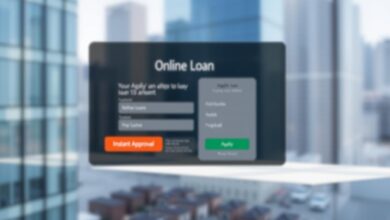Low Interest Personal Loans: Your Guide to Affordable Financing
More people are choosing affordable personal loans for their benefits. These include easier monthly payments and flexible repayment plans. At least 10% of those who got personal financing got the best rates, showing how crucial a good credit score is.
Low APR personal loans are great for those who want to pay off debt or cover big expenses. Getting a loan with a competitive personal loan rate can greatly lessen your financial stress. We’ll look into how these loans can help you manage your finances better.
Key Takeaways
- Understanding the benefits of low interest personal loans.
- The importance of creditworthiness in securing competitive rates.
- How affordable personal loans can offer flexible repayment terms.
- The advantages of consolidating debt with a low APR personal loan.
- Tips for securing the most competitive personal loan rates.
What Are Low Interest Personal Loans?
Low interest personal loans are a good choice for those looking for affordable credit. They offer funds at a lower cost than traditional loans.
Definition and Overview
Low interest personal loans are a type of unsecured loan. They can be used for many things, like paying off debt or fixing up your home. They have lower interest rates than other loans, which is great for keeping costs down.
These loans are also flexible. Borrowers can pick from different personal loan options based on their financial needs. This way, they can find a loan that fits their situation best.
Common Uses for Personal Loans
People use low interest unsecured loans for big expenses or to reorganize their finances. Here are some common uses:
- Consolidating debt into one easier-to-manage loan
- Financing home improvement projects
- Covering unexpected medical or car repair costs
- Funding major purchases or events
Choosing low interest personal financing means better repayment terms and best personal loan rates. This can save you money over time.
Benefits of Low Interest Personal Loans
Low interest personal loans offer financial relief and flexibility. They come with competitive personal loan rates. This means borrowers can handle their finances better.
Lower Monthly Payments
Low APR personal loans help lower monthly payments. With APRs starting at 6.49%, you can save a lot each month. This makes budgeting easier.
With less money going to loan payments, you can use it for other important things. This improves your financial health.
Debt Consolidation Opportunities
Low interest personal loans are great for consolidating debt. They let you combine several debts into one with a lower interest rate. This simplifies your finances and saves money over time.
It’s a smart choice for those wanting to manage their debt better. It can lead to big savings and easier financial management.
Flexibility in Loan Amounts
Affordable personal loans offer flexibility in loan amounts. You can get a loan that fits your financial needs, big or small.
This flexibility, along with competitive personal loan rates, makes these loans appealing for many financial needs.
Eligibility Criteria for Low Interest Loans
Knowing what you need for a low interest personal loan is key. Lenders check these criteria to see if you can pay back the loan.
Credit Score Requirements
Lenders first look at your credit score. A high score means you’ve borrowed and paid back well. They usually want a score of 700 or more for the best personal loan rates.
Keeping a good credit score is important for low interest personal financing. Check your credit report for mistakes. Also, make payments on time and pay off debts to improve your score.
Income Verification and Documentation
Lenders want to see you can afford to repay the loan. You’ll need to show proof of income. This can be pay stubs, W-2 forms, or tax returns.
Other Factors Lenders Consider
Lenders also look at your debt-to-income ratio, job history, and financial stability. A low debt ratio and a steady job can help you get competitive personal loan rates.
Understanding these factors helps you prepare for loan approval. This way, you can find the right personal loan options for you.
To qualify for low interest personal loans, you need a good credit score, stable income, and a solid financial situation. Focus on these areas to increase your chances of getting the loan you need at a good interest rate.
How to Find the Best Low Interest Personal Loans
There are many lenders with competitive personal loan rates. To find the best, you need to do some research. Look at different loan offers carefully.
Researching Different Lenders
Start by looking at different lenders. This includes banks, credit unions, and online lenders. Each has its own advantages and disadvantages.
- Traditional banks often offer competitive personal loan rates to their existing customers.
- Credit unions are known for their favorable terms and lower interest rates.
- Online lenders provide a convenient platform for comparing low interest unsecured loans and often have a quicker application process.
Comparing Loan Offers
After finding potential lenders, compare their loan offers. Look at more than just the interest rate. Check fees, repayment terms, and loan amounts too.
- Check the Annual Percentage Rate (APR), which includes both the interest rate and fees.
- Consider the repayment term and whether it aligns with your financial goals.
- Evaluate the loan amount to ensure it meets your needs without being excessive.

Reading Customer Reviews
Customer reviews can give you insights into a lender’s reputation and service. Look for reviews on independent platforms for a balanced view.
“I was surprised by how quickly I got approved for my personal loan. The online application was straightforward, and the customer service was responsive.”
By researching lenders, comparing loan offers, and reading reviews, you can find the best low interest personal financing options. This careful approach will help you get a loan that supports your financial goals without costing too much.
Fixed vs. Variable Interest Rates
Choosing between a fixed and variable interest rate can greatly affect your finances when getting a low APR personal loan. It’s important to know the differences between these rates to make the right choice.
Pros and Cons of Fixed Rates
Fixed interest rates stay the same over the loan’s life. This makes budgeting easier because your payments won’t change. But, if interest rates drop, you might pay more unless you refinance.
Some benefits of fixed rates include:
- Predictable monthly payments
- Protection against rising interest rates
- Easier budgeting
Understanding Variable Rates
Variable interest rates change with the market. As Investopedia explains, they’re often linked to a benchmark rate, like the prime rate. They might start lower than fixed rates but could go up, raising your payments.
To better understand the differences, let’s examine a comparative table:
| Feature | Fixed Interest Rate | Variable Interest Rate |
|---|---|---|
| Predictability | High | Low |
| Interest Rate Changes | Remains the same | Fluctuates with market |
| Monthly Payments | Consistent | Can vary |
| Risk Level | Low | High |
When choosing between fixed and variable rates for your low interest personal loan, think about your finances, risk comfort, and market conditions. Fixed rates offer stability and predictability. Variable rates might start lower but could change, so they’re riskier.
The Application Process Explained
Getting a low interest personal loan is easier with the right help. We’ll look at how to get affordable personal loans. It’s key to know what lenders want from you.
When you apply for a personal loan, several things matter. Lenders check your credit, income, and debt-to-income ratio. Knowing this helps you get ready for the application.
Steps to Apply for a Loan
The loan application starts online for most lenders. Here’s what you need to do:
- Check your credit score and history to ensure you’re eligible for low interest personal financing.
- Gather required documents, such as proof of income and identification.
- Submit your application through the lender’s website or platform.
- Review and accept the loan offer if approved.
Lenders like LendingClub and Upstart make it easy. They say, “Our platform is designed to provide borrowers with personalized loan options, making it easier to find the right fit.”
Information Required During Application
To apply for a personal loan, you’ll need to share personal and financial details. This includes:
| Information Type | Description |
|---|---|
| Personal Details | Name, address, date of birth, and Social Security number. |
| Financial Information | Income details, employment history, and existing debts. |
Having this info ready helps speed up the application. It also boosts your chances of getting a good personal loan option.
In conclusion, knowing the application process is key for affordable personal loans. Being prepared and knowing what to expect makes the process smoother.
Interest Rates: How They Are Determined
Interest rates on personal loans are not random. They are based on several important factors. Lenders look at these factors to figure out the risk of lending to a borrower. This risk affects the interest rate they offer.
Factors That Influence Interest Rates
Several things affect the interest rates for low interest personal loans. These include:
- Creditworthiness: People with higher credit scores get lower interest rates. This is because they are seen as less risky.
- Loan Term: The length of the loan also matters. Shorter loans usually have lower interest rates.
- Loan Amount: The size of the loan can change the interest rate. Larger loans might have different rates than smaller ones.
- Economic Conditions: The state of the economy, including inflation and monetary policy, affects interest rates.
Knowing these factors helps borrowers guess the interest rates they might get for low APR personal loans.
Importance of Market Trends
Market trends greatly influence personal loan interest rates. Lenders watch the market closely. They adjust their rates based on changes in benchmark interest rates and economic signs.
| Market Trend | Impact on Interest Rates |
|---|---|
| Economic Growth | Interest rates may rise as lenders respond to increased demand for credit and higher inflation expectations. |
| Economic Downturn | Interest rates may fall as lenders try to stimulate borrowing and economic activity. |
| Inflation Increase | Interest rates may increase to keep pace with inflation and maintain the purchasing power of the lent amount. |
By keeping up with market trends, borrowers can find better personal loan rates.
Improving Your Chances of Approval
To get a competitive personal loan rate, focus on your financial health. Lenders look at many things when they decide on loans. Being proactive about your finances can really help.
Tips to Boost Your Credit Score
Your credit score is key for getting low interest personal financing. Here are some tips to boost it:
- Pay your debts on time to show you’re responsible with credit.
- Keep your credit use under 30% to show you can handle it well.
- Check your credit report often to fix any mistakes.
- Don’t apply for too many credit cards or loans at once, as it can hurt your score.
Reducing Your Debt-to-Income Ratio
Lenders also look at your debt-to-income ratio. Here are ways to lower it:
- Pay off debts with high interest first to lessen your debt load.
- Think about combining debts into one, lower-interest loan to make payments easier.
- Get more money by taking on a side job or selling things you don’t need to pay off debt faster.
- Don’t take on new debt while you’re paying off old loans.
By working on these areas, you can greatly improve your chances of getting low interest unsecured loans. Lenders like Discover tell borrowers how important a good credit score and manageable debt are.

Improving your finances not only makes you more eligible for personal loans. It also opens up better personal loan options with better terms. By following these tips, you can manage your finances better and make smart borrowing choices.
Post-Loan Considerations
After getting a low interest personal loan, managing your payments is key. You need to know your loan terms and make a plan for on-time payments.
Managing Repayment Effectively
First, read your loan agreement to understand your repayment schedule, interest rate, and any late fees. Setting up automatic payments can help you avoid missing payments.
Also, save a part of your monthly income for your loan. This way, you can adjust your payments if needed. For example, if you get a bonus, use it to pay off your loan. This can lower your monthly payments.
Early Repayment Options and Fees
Think about repaying your loan early. Some lenders let you do this without extra fees, while others might charge you.
Check your loan agreement before making extra payments. If there’s no penalty, extra payments can save you on interest. This is true for low APR personal loans.
For instance, extra payments on a low APR personal loan can cut down interest costs. But, if your loan’s interest rate changes, adjust your payments to keep up.
Knowing your loan terms and planning your payments can help you manage your affordable personal loan well. This way, you can improve your financial situation.
Frequently Asked Questions About Personal Loans
When we talk about personal loans, many questions come up. People want to know about low interest personal financing and competitive rates. They also wonder how low interest unsecured loans can help them financially.
Common Concerns and Misconceptions
Many worry about how credit scores affect loan eligibility. We’ve talked about how credit scores play a big role in interest rates. Some think personal loans are only for emergencies. But, they can also help with debt consolidation and big purchases.
Where to Get More Help
If you need more info or help with personal loans, there are many resources. Companies like LightStream and Discover Personal Loans have guides and support. It’s smart to look at different lenders to find the best rates and terms. Knowing about low interest personal financing helps you make choices that fit your financial plans.









